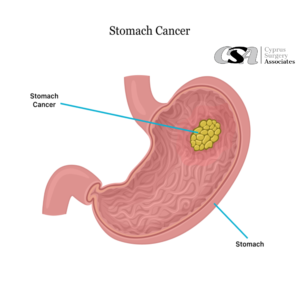
Gastric cancer is an abnormal growth of cells that begins in the stomach. The stomach is a muscular sac located in the upper middle of your abdomen, just below your ribs. Your stomach receives and holds the food you eat and then helps to break down and digest it.
Gastric cancer can affect any part of the stomach.
Where cancer occurs in the stomach is one-factor doctors consider when determining your treatment options. Treatment usually includes surgery to remove the stomach cancer. Other treatments may be recommended before and after surgery.
Causes
Scientists don’t know exactly what makes cancer cells start growing in the stomach. But they do know a few things that can raise your risk for the disease such as:
- Infection with a common bacteria, H. pylori, causes ulcers.
- Gastritis,
- Pernicious anemia,
- Stomach polyps also can make you more likely to get cancer.
Other things that seem to play a role in raising the risk include:
- Gastroesophageal reflux disease
- Obesity
- A diet high in salty and smoked foods
- A diet low in fruits and vegetables
- Family history of stomach cancer
- Long-term stomach inflammation (gastritis)
- Smoking
Gastric cancer – Symptoms
Signs and symptoms of stomach cancer may include:
- Difficulty swallowing
- Feeling bloated after eating
- Feeling full after eating small amounts of food
- Heartburn
- Indigestion
- Nausea
- Stomach pain
- Unintentional weight loss
- Vomiting
Loss of appetite
Prevention
To reduce the risk of stomach cancer, you can:
- Maintain a healthy weight.
- Choose a diet full of fruits and vegetables.
- Reduce the amount of salty and smoked foods you eat.
- Stop smoking.
Gastric cancer – Diagnosis
Tests and procedures used to diagnose stomach cancer include:
- upper endoscopy: a tiny camera to see inside your stomach looks for signs of cancer.
- Biopsy: If any suspicious areas are found during the upper endoscopy, special tools can be used to remove a sample of tissue for testing. The sample is sent to a lab for analysis.
- CT scan: This is a powerful X-ray that makes detailed pictures of the inside of your body.
- Barium swallow.
Gastric cancer – Treatment
Treatment options for stomach cancer depend on the cancer’s location, stage, and aggressiveness.
Surgery
The goal of surgery is to remove all of cancer and some of the healthy tissue around it.
Operations used for stomach cancer include:
- Subtotal gastrectomy. During subtotal gastrectomy, the surgeon removes the part of the stomach affected by cancer and some of the healthy tissue around it. This operation may be an option if your stomach cancer is located in the part of the stomach nearest the small intestine.
- Total gastrectomy. Total gastrectomy involves removing the entire stomach and some surrounding tissue. The esophagus is then connected directly to the small intestine to allow food to move through your digestive system. Total gastrectomy is used most often for stomach cancers that affect the body of the stomach and those that are located in the gastroesophageal junction.
- Surgery to relieve signs and symptoms. An operation to remove part of the stomach may relieve signs and symptoms of growing cancer in people with advanced stomach cancer.
Chemotherapy
Chemotherapy is a drug treatment that uses chemicals to kill cancer cells.
Chemotherapy can be given before surgery or after surgery to kill any cancer cells that might remain in the body. Chemotherapy is often combined with radiation therapy.
Chemotherapy may be used alone or with targeted drug therapy in people with advanced stomach cancer.
Radiation therapy
Radiation therapy uses high-powered beams of energy, such as X-rays and protons, to kill cancer cells.
For stomach cancer, radiation therapy can be used before surgery or after surgery to kill any cancer cells that might remain. Radiation therapy is often combined with chemotherapy.
For advanced stomach cancer that can’t be removed with surgery, radiation therapy may be used to relieve side effects, such as pain or bleeding, caused by growing cancer.
Targeted drug therapy
These drugs attack cancer cells but leave healthy ones alone, which may mean fewer side effects.
Immunotherapy
Immunotherapy is a drug treatment that helps your immune system to fight cancer. For stomach cancer, immunotherapy might be used when the cancer is advanced, if it comes back, or if it spreads to other parts of the body.
Supportive (palliative) care
Palliative care is specialized medical care that focuses on providing relief from pain and other symptoms of a serious illness.





